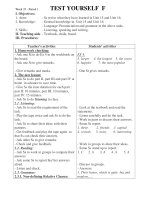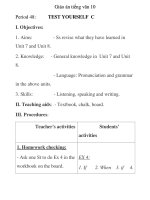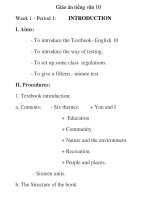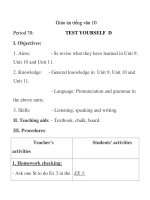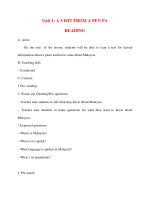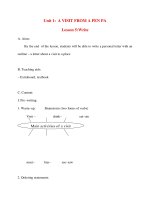Giáo án Tiếng Anh lớp 10: Unit6: ENVIRONMENT Lesson 3 : Listening docx
Bạn đang xem bản rút gọn của tài liệu. Xem và tải ngay bản đầy đủ của tài liệu tại đây (70.84 KB, 5 trang )
Unit6: ENVIRONMENT
Lesson 3 : Listening + LF.1,2
A. Aims:
By the end of the lesson, students will be able to listen to the text for details and
complete the notes about it, and get more practice with adverb clauses of reasons
* Teaching aids: Tape
b. Content:
I. Pre
listening:
1. Warm
up:
Old lesson:
–
How can we protect the environment?
–
How do you prevent littering?
–
How do we reduce the amount of garbage?
2. Pre–teach:
–
Sewage (n) : nước thải, nước cống (explanation)
–
raw (adj) : chưa xử lý/ sống/thô (translation)
–
Pump (v) : bơm (mime)
thải
–
Spill (v) : tràn ra (picture)
–
Leak (v) : rò rỉ (explanation)
–
Waste material (n): vật liêu phế thải (explanation)
–
Dump (v/n) : đổ thành đống (rác), vứt bỏ/ đổ ầm xuống (translation)
*Checking: R.O.R
3. Open–prediction:
–
Students read the incomplete table on page 50 (silently and carefully,
thoughtfully)
–
Students in pair discuss and predict what can pollute the ocean
II. While listening:
(Students listen to the tape and complete the notes)
*Key: Secondly: Garbage is…
Thirdly: ….come from ship at sea
Next: waste material from factories
Finally: oil is washed from land
III. Post
listening:
1.Comprehension questions:
a, Is the ocean polluted? (Why?)
b, What pollutes the ocean?
*Key:
a, Yes, It is. (Because many people are careless or litter delibrately)
b, Saw sewage, garbage, oil and waste materials from factories pollute the ocean.
* Tape transcript :
Our oceans are becoming extremely polluted. Most of this pollution comes
from the land, which means it comes from people. Firstly, there is raw sawage, which
is pumped directly into the sea.Many countries both developed and developing, are
guilty of doing this.Secondly,ships drop about 6 million tons of garbage into the sea
each year.Thirdly, there are oil spills from ships. A ship has an accident and oil leaks
from vessels. This not only pollutes the water, but also kills marine life.Next, there
are waste materials from factories. Without proper regulations, factory owners let the
waste run directly into the rivers, which then leads to the sea. And finally, oil is
washed from the land.This can be the result of carelessness or a deliberate dumping
of waste.
2. Grammar:
A, Adverb clauses of reasons:
(Eliciting from the listening text)
–
The ocean is polluted because saw sewage is pumped directly into the sea
–
Since saw sewage is pumped , the ocean is polluted
–
As saw sewage is pumped…, the ocean is polluted
Form : As/ since/because + S + V, Main clause
Main clause + because/ since/ as + S + V
Meaning :
Use : Mệnh đề trạng ngữ chỉ lý do nêu lên lí do của hành động trong mệnh đề chính.
*Notes:
–
“because” can be at the beginning of the sentence or between the two clauses
–
“ Because…” is used to answer the questions with “Why”
B, Adverb of manner:
Eg: Tom is a careful driver. He drives carefully.
Form : Adjective + _ly = adv of manner.
Eg: kind
kindly
Serious
seriously
Happy
happily
Simple
simply
Extreme
extremly
But : Good
well
Fast
fast
Hard
hard
Use : modify verbs and sentence
3.Practice:
1. Join the pairs of sentences together, use “because”,”as” or “since” (P.54)
*Key:
a.
I’m tired because I stayed up late watching TV (Because/as/since)
b.
I have a broken leg (because/since/as) I fell over while I was playing
basketball.
c.
I’m going to be late for school (because/since/as) the bus is late
d.
I broke the cup (because/since/as) I was careless
e.
I want to go home (because/since/as) I feel sick
f.
I’m hungry (because/since/as) I havn’t eaten all day.
2. Change the adjectives into adverbs then use the adverbs to complete the
sentences(P.53) (individually)
*Key:
b.The old man walked slowly.
c.Tuan sighed sadly
d.The baby laughed happily
e.Mrs Nga speaks English quite well
IV. Homework:
1, Do exercises 4,5 (P42,43) (workbook)
2, Complete the exercises given in “Practice”
3, Find out new vocabulary in “Read” (P.51)
V.Teacher’s self-evaluation:

